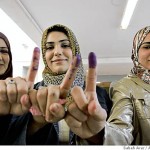 BAGHDAD
(AP) — Iraqi election officials began handing out new, computerized
voter identification cards Saturday across the capital as the country
prepares for its first nationwide election since the withdrawal of U.S.
troops.
BAGHDAD
(AP) — Iraqi election officials began handing out new, computerized
voter identification cards Saturday across the capital as the country
prepares for its first nationwide election since the withdrawal of U.S.
troops.
But
the more than $100 million push to modernize voting comes as officials
can’t distribute cards in embattled Anbar province, where al-Qaida
fighters seized control of parts of two cities, and as militant attacks
rage on unabated, killing at least 14 people alone Saturday and wounding
nearly two dozen.
The
new voter cards, which include a computer chip, will allow election
officials to check a voter’s identity and try to halt fraud. Several
Iraqi political blocs alleged that some people voted multiple times in
the last vote in 2010, although the results of the election were not
widely disputed.
In
previous elections, voters had to go through lists glued outside
balloting centers to find their names before going inside. Spanish
technology firm Indra signed a five-year deal with Iraq to supply the
new system and train election officials.
Nearly
22 million Iraqis are eligible to cast their ballots in coming April 30
parliamentary elections. Prime Minister Nouri Al-Maliki is eying a
third term in office despite objections from political rivals who accuse
him of marginalizing partners and seizing control of state institutions
to consolidate power.
In
a televised speech Wednesday, al-Maliki reiterated a pledge to not
delay elections because of the violence, calling on people to overcome
any reluctance to pick up cards “because their vote will be decisive
this time.”
Voters
in 13 of Iraq’s 18 provinces began to receive cards three weeks ago,
Independent High Electoral Commission official Aziz al-Kheikani said.
Distribution began Saturday in four new provinces, including the
capital, Baghdad, he said.
Saddam Raheem Jassim, a resident of Baghdad, received his card Saturday and praised the effort.
“This
identity chip for voters, looking at its form and shape, is good,”
Jassim said. “It looks like they made big effort for it, for the sake of
Iraqi people. This will ensure our rights and prevent any means of
forgery in the election.”
Meanwhile
Saturday, two bombs targeted a four-vehicle patrol in the town of
al-Saadiyah, 140 kilometers (90 miles) northeast of Baghdad, a police
officer said. Militants opened fire on the troops after the bombing in
an attack that killed nine and wounded four, he said.
The
attack came hours after three car bombs exploded in the city of Tikrit,
some 130 kilometers (80 miles) north of Baghdad, another police officer
said. The officer said the blasts near the homes of local security and
civilian officials killed five people and wounded 18.
Two
medical officials confirmed figures. All officials spoke on condition
of anonymity as they were not authorized to release information to
journalists.
Fierce
clashes pitting government security forces and allied Sunni tribal
militias against a coalition of insurgents also have been raging in
western Iraq’s Anbar province since late December. An al-Qaida offshoot
and other insurgent groups have taken control of the city of Fallujah
and parts of the provincial capital, Ramadi. Thousands have fled the
violence.
On
Saturday, al-Maliki announced a three-day halt of military operations
in Fallujah as a “goodwill” gesture. In a statement read on state
television, al-Maliki said the halt began Friday and will last through
Monday after requests from clerics and tribal sheiks to halt the
bloodletting.
Al-Maliki’s
statement did not say whether military operations would resume after
the halt. Government officials could not be immediately reached for
comment.
Source: US News and World Report